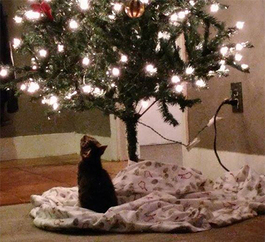
With the holidays approaching, it’s time to think not only about celebrating, but also about cat safety. Any changes in a cat’s regular routine – a home suddenly filled with new scents, sounds and strangers -- may send even the least “scaredy-cat” cats scampering for cover.
Be conscious of and careful about the plants you bring into your home. Despite their obvious beauty, holly, mistletoe and poinsettia are toxic to cats and should be kept out of reach, while a single leaf from any form of lily is lethal. The oils of a Christmas tree can irritate their mouths and stomachs, causing vomiting, while the prickly needles are hazardous to their entire GI tracts.
To err on the side of caution, consider buying an artificial tree and artificial plants instead.
Consider next the breakable ornaments and dangling tinsel, shiny ribbons and artificial snow, ropes of small lights and flickering candles. All eye-catching eye candy to curious kitties with batting paws, small, sharp teeth and swishing tails.
Hang delicate ornaments higher on the tree and resist placing any in decorative bowls on low surfaces. Not only can cats choke on them, but the sharp edges of any broken pieces can lacerate their mouths, throats and intestines. Drape tinsel higher on the tree as well, and keep ribbons on gifts underneath the tree to a minimum. If tinsel or ribbons are swallowed, they can twist and bunch inside a cat’s intestines, causing serious, sometimes fatal, damage if not caught quickly enough.
Artificial snow is toxic and should be avoided at all costs. Lights, large and small, solid and flickering are another danger, not only because they are hot and breakable, but because of the electrical cords holding them together. If bitten, they can cause electrical shock if not properly grounded, and if frayed, they can cause severe lacerations to your cat’s tongue.
Place all lighted candles out of reach to reduce the risk of singed fur and pads, paws and tails, and lower the chance of them being tipped over, leaving burning wax everywhere or worse, starting a fire.
As appetizing as holiday fare is for people, it can prove agonizing, even lethal for pets. The most notorious offenders are:
Raisins and grapes: A handful of raisins can cause sudden kidney failure in a cat. Also avoid giving her grapes, while watching for signs of toxicity should she accidentally eat some. Signs that usually occur within 24 hours are lack of appetite, lethargy, weakness, abdominal pain, diarrhea, and decreased urination.
Onions and garlic: The sulfoxides and disulfides in both destroy red blood cells and can cause serious blood problems including anemia.
Fat trimmings: They cause upset stomachs, vomiting, and diarrhea.
Bones: Whatever the size, shape or texture, they all spell the same thing: danger. From throat scratches to stomach perforations to bowel obstructions. To safeguard against these painful possibilities, all leftovers, particularly bones, should be carefully wrapped and promptly disposed of.
Alcohol: It’s traditional to celebrate the holidays with more alcohol than usual – in cooking and in drinks such as eggnog and fruit punch. For safety’s sake, keep these temptations (including partially eaten plates of food and half-empty glasses) out of the reach of your cat to avoid intoxication and alcohol poisoning.
Chocolates: Although chocolate has long been taboo for cats, most chocolates are wrapped in foil for the holidays. Now, not only can your cat get sick from eating the chocolate, the wrappers themselves can get stuck in her throat or cause problems as they work their way through her digestive tract.
Christmas pudding, cake and mince pie: Filled with potentially toxic raisins, currants, and sultanas, they are also made with fat and suet, and laced with alcohol -- from scotch and brandy to sugary liqueurs.
With some strategic planning beforehand, you and your cherished kitty companion can enjoy the happiest and healthiest of holidays.

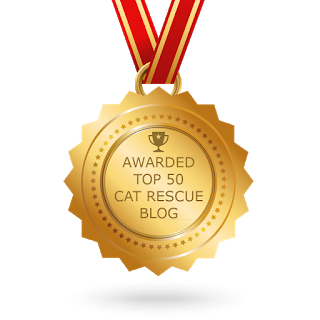
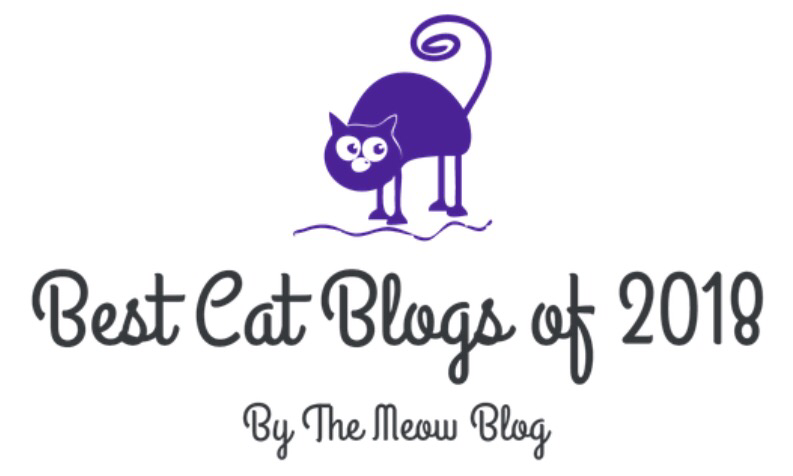

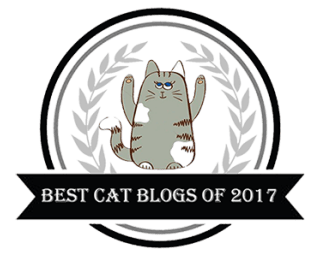
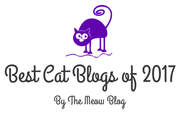



 RSS Feed
RSS Feed